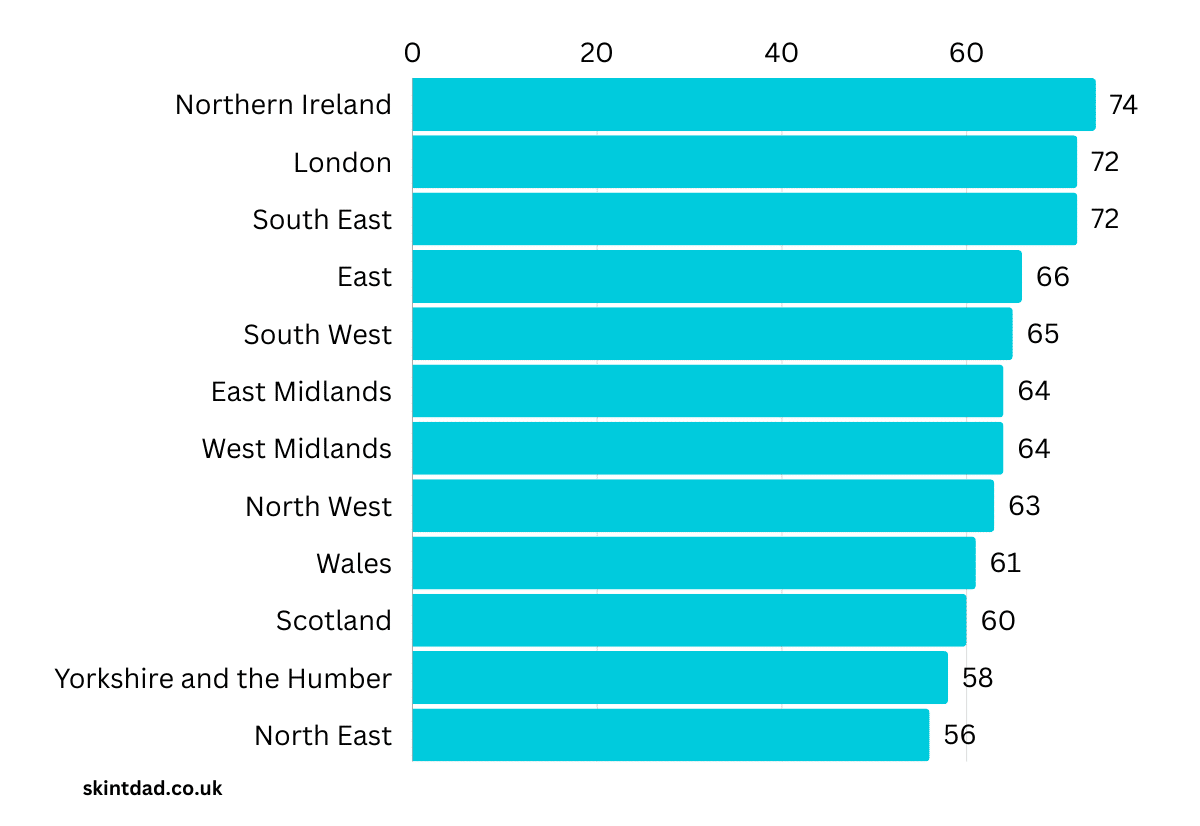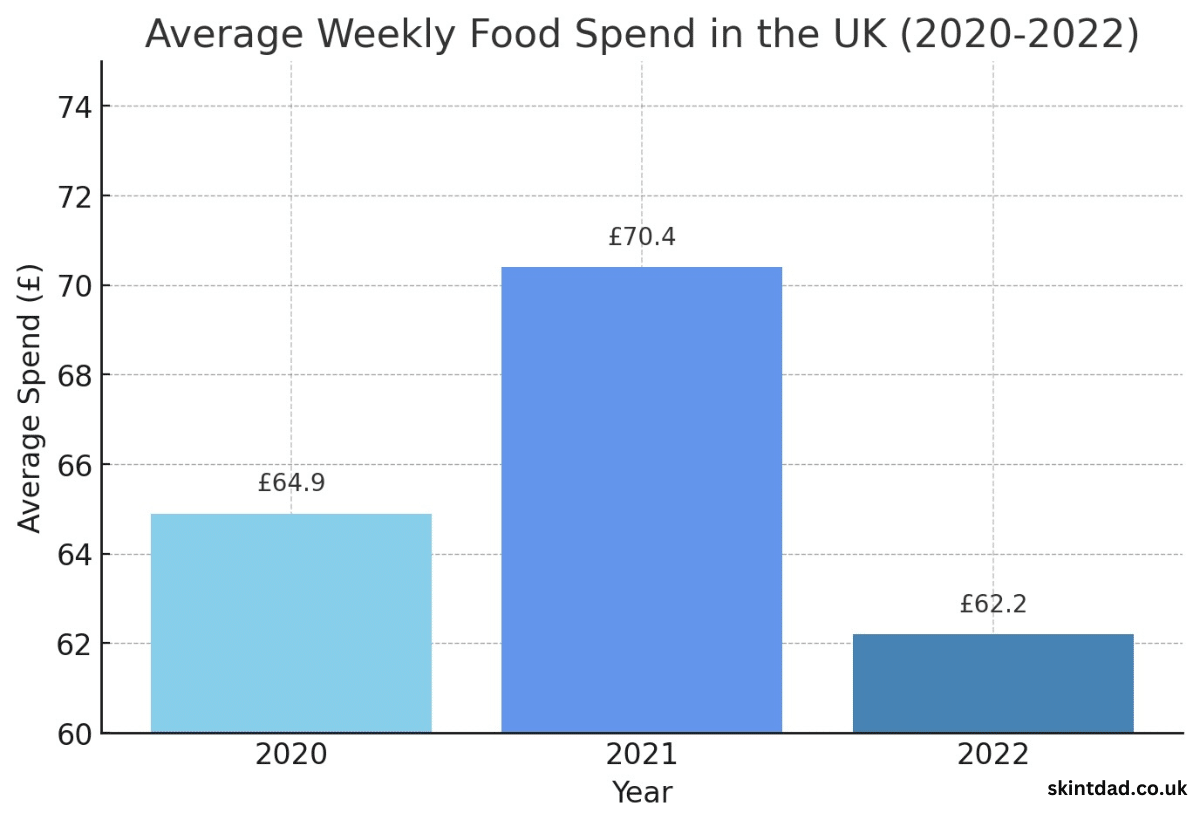Find out the UK food shop costs for families, singles, and couples, including trends, regional differences, and smart budgeting tips.

Have you ever wondered how much the average family or household in the UK spends on their weekly food shop?
Knowing how much others spend can help us set our own budgets, keep bills on track, and find ways to save.
Get a free £10 bonus with Swagbucks
Earn a bit of extra money in your spare time with surveys, videos, and simple tasks you can do at home.
New users can get a £10 bonus when they sign up.
Get the £10 bonus
Today, we’re diving into the world of grocery bills – whether you’re flying solo or part of a family of four.
Depending on how many people are in your household, it can make a difference to the average cost per person.
It’s not just about multiplying a one-person spend by four (if that’s how many people live in your home). Homes with more people will generally spend (on average) less per person as you can take advantage of bulk buys and discounts on bigger pack sizes.
Understanding the UK’s food spending habits
Over the past decade, we’ve seen massive shifts in our food shopping habits.
One of the biggest changes has been the steady increase in spending.
This isn’t just due to rising food prices; it also reflects a change in our eating patterns and preferences.
A few years ago, the trend was towards value and convenience, with a boost in the popularity of budget supermarkets and ready meals.
However, recent years have seen a growing interest in health and sustainability, with more people willing to spend a bit extra on organic produce, plant-based options, and environmentally friendly packaging.
It’s not just about what you shop for – where you live in the UK also plays a role in your food spending. Typically, urban areas, especially in the South of England, see higher food expenditures than rural areas.
Lifestyle and dietary choices also have a big impact on food spending. A household of vegetarians or vegans might spend less on average compared to those who include meat in their diet, as meat tends to be more expensive.
Similarly, households with specific dietary needs, like gluten-free or dairy-free, will find their grocery bills a bit higher due to the premium price of these specialised products.
But, for an overall view, let’s look at how much people spend on groceries.
General average food bill
The average person in the UK spends about £62.20 each week on food. This also includes spending on non-alcoholic drinks like tea/coffee, fruit juices and squash.
That might not seem like a lot (or maybe it does?)
This figure includes everything from your morning cereal to the cheeky chocolate bar you treat yourself to after work.
However, these figures are based on survey data to the end of 2022 (as soon as new data is released, we’ll update).
Up to January 2024, food prices continued to soar by 8%! Around 40% of people have had to spend more money when food shopping to get their usual trolleys, and survey results from October 2023 show that 47% of people are buying less than they usually do.
Remember, this is just an average – some spend more, and some spend less, particularly on a week to week basis.
For instance, I don’t buy washing detergent every week, and I try to budget for cheaper meals when I know we’ll have additional costs for cleaning products in others.
Difference in where you live
The averages also work out differently depending on where you live in the country.
Households in the South East, London and Northern Ireland typically spend more each week than those living in the North East and Yorkshire and the Humber.

Average food costs over time
The average spending on groceries has changed over the years, going up when people were at home during COVID and then sharply falling:
- 2020 – £64.90
- 2021 – £70.40
- 2022 – £62.20

Weekly bill for one
Living alone? Based on ONS data, your weekly food bill might be around £33.50.
This covers all your meals, snacks, and even special weekend treats.
It’s important to remember that even though you’re only buying for one, you can still find clever ways to save, like batch cooking or buying store-brand products.
Weekly grocery bill for a family of four
A family of four in the UK spends about £86.30 weekly on food. On average, this works out to around £374 a month.
That’s breakfasts, lunches, dinners, and all the snacks in between for two adults and two little ones.
Feeding a family can be pricey, but you can make the most of every penny with smart shopping and meal planning.
Average weekly spend for two
If you’re part of a duo, your average weekly food shop might be around £63.70.
Whether it’s you and a flatmate or you and your partner, this figure can help guide your budget.
Cooking at home and planning meals can be a game-changer for saving money.
(Data is from the Living Costs and Food Survey from the Office for National Statistics.)
Understanding what others spend can give you a benchmark for your own grocery budget, and then you can still find savvy ways to cut down on your grocery spending.
It’s worth remembering that these are just averages – your spending may likely be different.
Depending on whether households have food intolerances, allergies, or specific diets that need to be followed, it can have a massive sway on how much is spent.
If you’re looking to budget, also be sure to take into account the average household bills each month too.
Saved a few quid with our tips?
If Skint Dad has helped you spend less or feel more in control of your money, you can support the site with a small contribution.
- I was sent a fake HMRC tax notice. Here’s how to spot the scam - 8 January 2026
- A once-a-year money check most families forget (with rough savings) - 6 January 2026
- The January bills reality check: the traffic light method that works - 1 January 2026

shaz says
“A family of four in the UK spends about £86.30 weekly on food. On average, this works out to around £374 a month.”
Can you explain how that works out to be correct?
Grab a calculator this time before posting a mathematics article about finances.
Naomi Willis says
Hi Shaz,
The data was captured by sample surveys carried out by the Office of National Statistics.
So, £86.30 x 52 weeks of year works out at £4,487.60. If you divide the annual number by 12 months, you get £373.966667 for one month (which we rounded up to £374). We always prefer to round up numbers when it comes to budgeting, so there is less chance of failing on a budget and it gives a slight buffer.
Pretty much no one budgets their weekly shop over a year, and we’ve found that most budget monthly, so use the average monthly figure. Week to week, shopping costs can vary depending if you need to get top ups on bigger ticket items such as washing detergent etc or due to seasonal trends, which is again why we wanted to show an average monthly figure.
Anonymous says
Can we really trust the ONS?
Elaine Andrews says
Fascinating! I reckon to spend approx £25 p.w. On food as an elderly divorced single. Often frozen veg and market fresh veg even Riverford occasionally. For instance an organic cucumber lasts on average twice as long having less water and more substance. I’m more Pescatarian than a meat eater and aim to eat veggie half the week. I always add in reductions on favourite foods and beverages which a nectar or Tesco card makes considerably cheaper. Dairy and soups as backup for homemade in a pressure cooker from Aldi and organic eggs likewise. Plenty of fruit and a forae into an occasional packet of fig rolls, ginger nuts or custard tarts mean I have a simple but healthy diet topped off with a bar of chocolate marzipan now and again. Cheese and onion crisps could be my downfall but I leave the multi pack in the car and take a bag at a time. I’m on Pension credit so I need to keep within my budget . Turkey crown at Christmas bought on nectar points or donated to charity. Thankyou for your helpful columns.
Wendy says
Love this Elaine similar circumstances to mine and I budget in a similar way/similar spends – interesting info about organic veg lasting a bit longer too. When married with kids at home and now as a single I have always shopped for reductions, planned meals in advance and done big batch cooks, Ive never been short of food and have a varied and healthy diet – its about some self discipline and organisation – pays off big time.
Anonymous says
Thanks for the crisps tip. I normally eat the whole multi pack in one go. Shall try the car method next time.